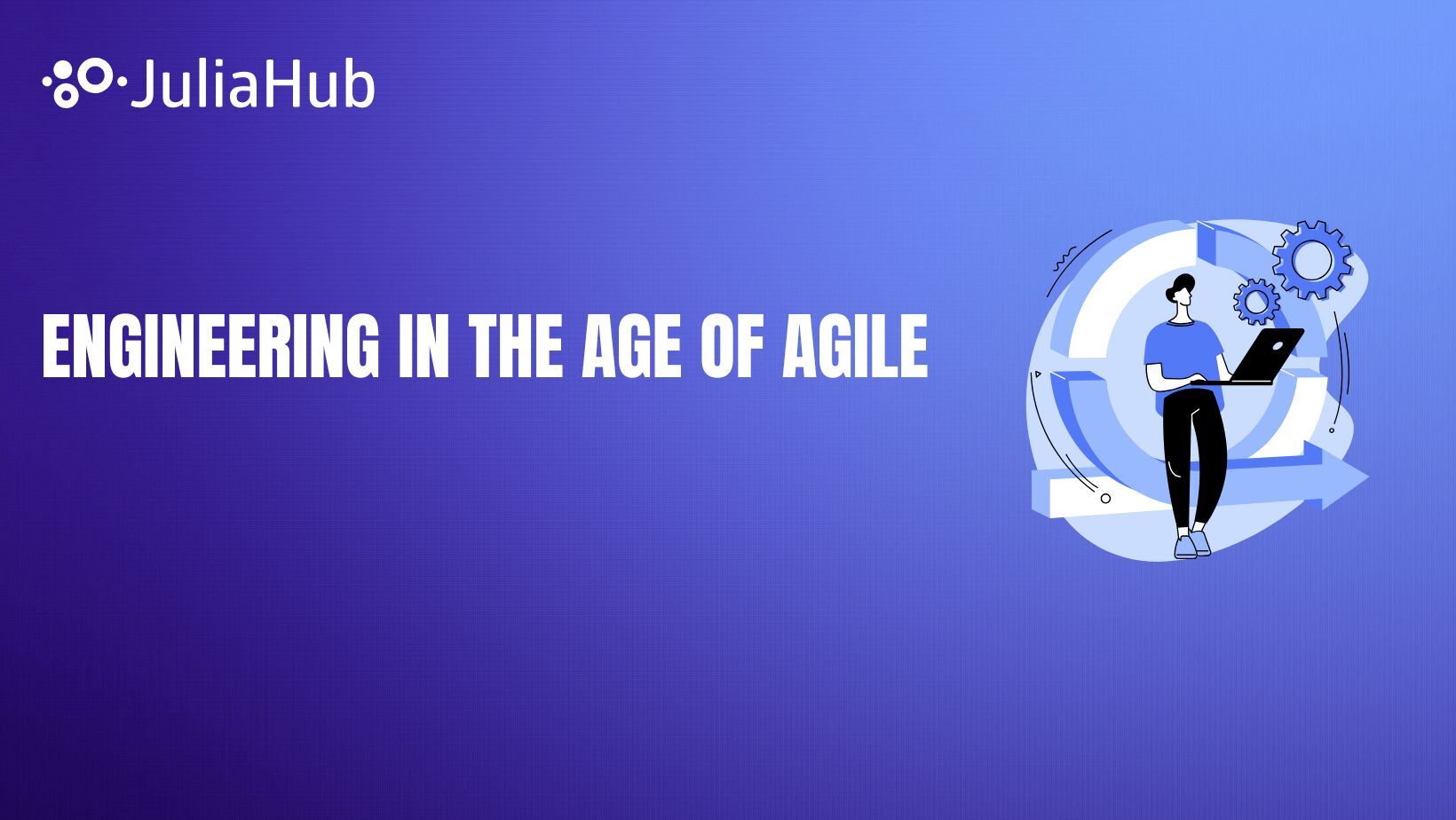Newsletter June 2022 - Julia for HVAC
ARPA-E Video Features Dyad (Formerly JuliaSim) from Julia Computing: AI for HVAC: How Julia Computing Uses Machine Learning to Tackle Building Efficiency with Dyad (Formerly JuliaSim) is a new 4 minute video from the Advanced Research Projects Agency - Energy (ARPA-E). Julia Computing uses artificial intelligence (AI) with Dyad to improve the efficiency of building heating, ventilation and air conditioning (HVAC) systems. Building operations are responsible for more than a quarter of annual carbon dioxide emissions and are therefore an important contributor to climate change.

JuliaCon 2022: JuliaCon 2022 will be free and online July 27-29.
-
Register for Free Today! Registration is required. Registration is free but donations are strongly encouraged for those who are able and want to support JuliaCon and the Julia community. Donations support initiatives such as Julia Community Prizes, Julia Summer of Code, Diversity & Inclusion, Infrastructure and more.
-
Sponsorship: JuliaCon sponsorships are available at the Platinum ($30,000), Gold ($15,000) and Silver ($5,000) level. Current and recent JuliaCon sponsors include Julia Computing, Julius Technologies, RelationalAI, Beacon Biosignals, PumasAI, QuEra, Conning, Invenia, Metalenz, ASML, G-Research, NumFOCUS, DataChef, Jeffrey Sarnoff, Amazon, Facebook, Google, Microsoft, Intel, Nvidia, JP Morgan, Capital One, BlackRock, Invenia, Gordon and Betty Moore Foundation, Juspay, Zapata, University of Maryland School of Pharmacy, Alfred P. Sloan Foundation, Replit, Maven, Gambit, Tangent Works, Alan Turing Institute, EVN and Voxel8.
-
Julia Community Prizes: The 5th annual Julia Community Prizes will be awarded during JuliaCon. You are encouraged to nominate groups or members of the Julia community for their contributions to the Julia language, community and/or ecosystem.
 JuliaHub 101 Webinar: Julia Computing is hosting a free JuliaHub 101 Webinar on June 28 from 1:30-2:30 pm Eastern (US). Click here to register. JuliaHub is the fastest, easiest portal to access Julia and create, manage and share packages, notebooks and applications. The Webinar is led by Jacob Vaverka (Julia Computing), an experienced modeling and simulation application developer. Participation in this Webinar is free but registration is required.
JuliaHub 101 Webinar: Julia Computing is hosting a free JuliaHub 101 Webinar on June 28 from 1:30-2:30 pm Eastern (US). Click here to register. JuliaHub is the fastest, easiest portal to access Julia and create, manage and share packages, notebooks and applications. The Webinar is led by Jacob Vaverka (Julia Computing), an experienced modeling and simulation application developer. Participation in this Webinar is free but registration is required.
Quantitative Systems Pharmacology (QSP) Webinar - Free from Julia Computing: Julia Computing is hosting a free Webinar on Quantitative Systems Pharmacology (QSP) in Julia with Pumas-QSP. The Webinar takes place on Thursday June 30 from 11 am - 12 noon Eastern (US). Click here to register. Pumas-QSP is a comprehensive cloud-based platform for quantitative systems pharmacological analytics. Dr. Elisabeth Roesch (Julia Computing) will demonstrate how Pumas-QSP facilitates faster, better modeling and simulation for quantitative systems pharmacology (QSP) improving product safety, clinical outcomes and speed to market. Learn why pharmaceutical companies such as Pfizer, Moderna, GSK, AstraZeneca, Sanofi are working with Pumas and how the speed and power of Julia enable better pharmaceuticals and better patient outcomes. Participation in this Webinar is free but registration is required.
JuliaHub 5.6: JuliaHub 5.6 is now available with several new and updated features:
-
Automatic package registration for Bitbucket server
-
Support for multiple private registries
-
Support for SSH protocol during package registration
-
UI to trigger package documentation generation
-
UI to view synchronization failures with pkg.juliahub.com
-
UI to disable package versions in registry
-
Support for SSL Offloading
-
UI to toggle Pkg Server authentication
Pumas v2.1: Pumas v2.1 is now available with a number of improvements and enhancements. Some highlights include:
-
Performance improvements
-
First-run execution time, overall memory footprint, and threading overheads have reduced
-
-
Improved linear and affine ODE support
-
Changed the implementation of the solution method based on matrix exponentials for linear systems of ODEs. The new implementation is more robust than the previous one and supports singular coefficient matrices
-
ODE models now allow for a constant term in the such as
y₁' = -0.5*y₁ + 1where the last term+1does not depend on any dynamic variable
-
-
Improvements to Bayesian inference
-
Methods from the MCMCChains package are now available to allow the user to analyze the results from the inference step more easily
-
New keyword options allow implementing stopping criteria based on the efficient sample size (through the
ess_per_chainkeyword infit) and time limits (through thetime_limitkeyword infit) -
The default
nchainsvalue increases from 1 to 4 to improve robustness of the algorithm
-
-
Allow simulating observations from SIR and Bootstrap output
-
The output of
inferusing theSIRorBootstrapmethods can now be used as the input tosimobs, creating simulated subjects according to the estimated uncertainty of the parameters -
The default
maxattemptsvalue forSIRincreases from 3 to 5 improving implementation robustness
-
-
Upgrade to Julia 1.7 and VS Code to 1.64.2.
Julia Computing - Coming to a Conference Near You: Julia Computing will be present at a number of upcoming conferences and events. Click below for more information.
-
Ljubljana: Population Approach Group Europe (PAGE) with Julia Computing Jun 28-Jul 1
-
San Francisco: Design Automation Conference (DAC) with Keno Fischer (Julia Computing) Jul 10-14
-
Pittsburgh: Society for Industrial and Applied Mathematics (SIAM) with Julia Computing Jul 11-15
-
Virtual Workshop: Joint Automated Repository for Various Integrated Simulations (JARVIS) - National Institute of Standards and Technology (NIST) - Artificial Intelligence for Materials Science (AIMS) with Chris Rackauckas (Julia Computing) Jul 12-14
-
Virtual Conference: JuliaCon with Julia Computing Jul 27-29
-
Dallas: American Modelica Conference with Julia Computing Oct 26-28
-
Aurora: American Conference on Pharmacometrics (ACoP) with Julia Computing Oct 30-Nov 2
-
New Orleans: Conference on Neural Information Processing Systems (NeurIPS) with Julia Computing Nov 28-Dec 9
Julia Computing Finance Seminar: Julia Computing returned to New York City on June 1 with a new in-person Julia Computing Finance Seminar. Julia co-creator and Julia Computing co-founder and Chief Product Officer Stefan Karpinski presented the latest Julia news as well as some features that are especially useful in the finance industry.
Stipple Webinar from Julia Computing Now Available Online: Julia Computing’s Jeremie Bouchard presented a new Webinar on Stipple, Building an Interactive App for Data Exploration and Model Explanation. Click here to watch.
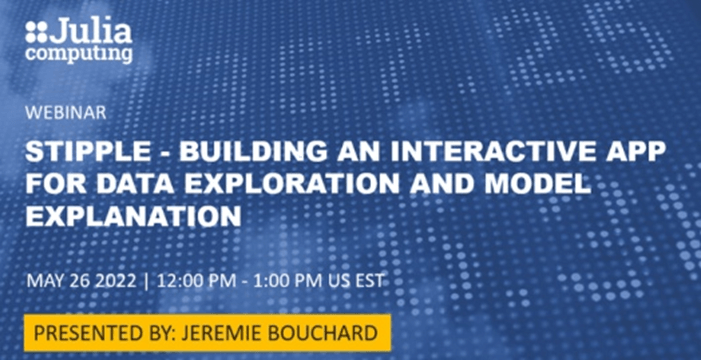 Pumas Workshop: Pumas-AI will present Pharmacometric Modeling and Simulation with Pumas at the Population Approach Group Europe (PAGE) conference in Ljubljana on June 27. This full-day Pumas workshop will be presented by Dr. Andreas Noack, Dr. Patrick Mogensen and Dr. Joga Gobburu.
Pumas Workshop: Pumas-AI will present Pharmacometric Modeling and Simulation with Pumas at the Population Approach Group Europe (PAGE) conference in Ljubljana on June 27. This full-day Pumas workshop will be presented by Dr. Andreas Noack, Dr. Patrick Mogensen and Dr. Joga Gobburu.
Participants will:
-
Gain an overview of the Pumas modeling ecosystem
-
Learn how to perform non-compartmental analysis in Pumas
-
Learn how to simulate using non-linear mixed effects models in Pumas
-
Learn the different estimation methods and perform data analysis using Pumas NLME
-
Learn how to perform post-processing of results for reporting
Julia Forem Launches: Julia Forem is a new Julia community platform for posting, reading, sharing and interacting with blogs and other technical and non-technical Julia content. Click here to learn more.
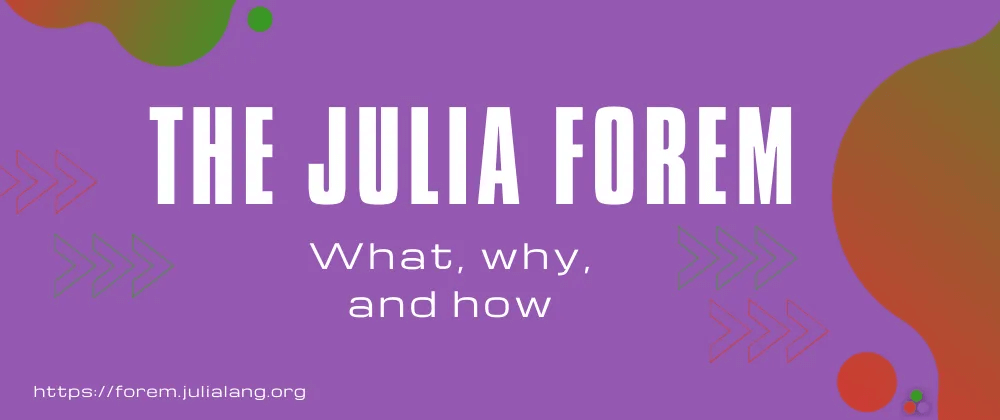 Google Summer of Code 2022 Selects 21 Students for Julia Projects: 21 students have been accepted by Google Summer of Code (GSoC) for projects using Julia. Click here for the full list of all 21 students and Julia projects.
Google Summer of Code 2022 Selects 21 Students for Julia Projects: 21 students have been accepted by Google Summer of Code (GSoC) for projects using Julia. Click here for the full list of all 21 students and Julia projects.
Julia in 160 Seconds: Fireship has published a short video description of Julia which now has more than 300 thousand views. Click here to watch.
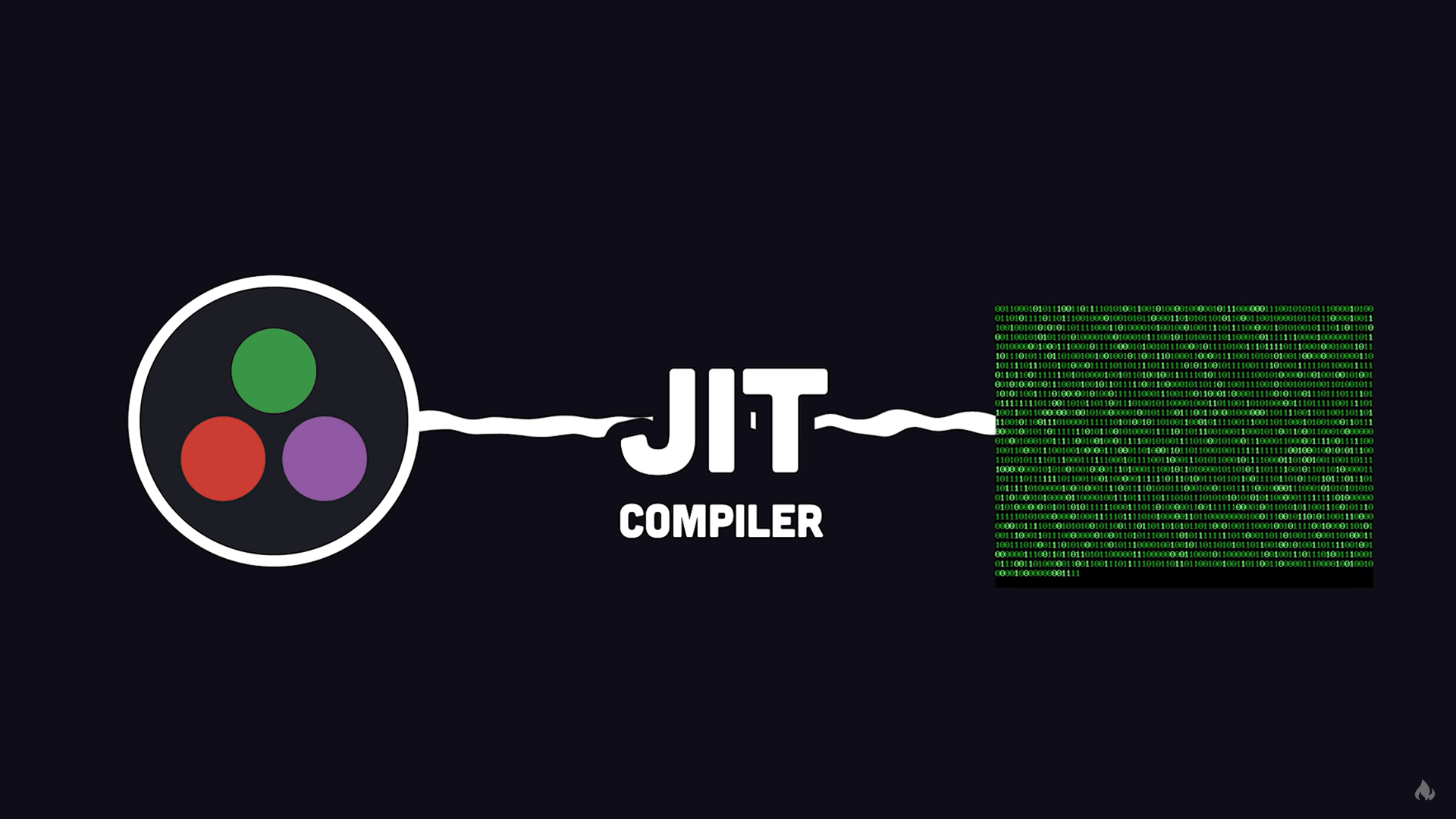 Hewlett Packard Enterprise Interview: Hewlett Packard Enterprise (HPE) Principal Technologist Ellen Friedman interviewed HPE Ezmeral Data Fabric CTO Ted Dunning about Julia. “Julia offers the flexibility of a dynamic language like Python but with the excellent performance you expect from a more static language such as Java,” Dunning explained. Dunning also described Julia as “extraordinarily expressive, even more expressive than Python.”
Hewlett Packard Enterprise Interview: Hewlett Packard Enterprise (HPE) Principal Technologist Ellen Friedman interviewed HPE Ezmeral Data Fabric CTO Ted Dunning about Julia. “Julia offers the flexibility of a dynamic language like Python but with the excellent performance you expect from a more static language such as Java,” Dunning explained. Dunning also described Julia as “extraordinarily expressive, even more expressive than Python.”
PhD Course in Scientific Machine Learning (SciML): Dr. Chris Rackauckas, Julia Computing Director of Modeling and Simulation, conducted a PhD course in Scientific Machine Learning (SciML) with more than 100 participants at the Technical University of Denmark (DTU) in Kongens Lyngby June 13-17. More information is available here.
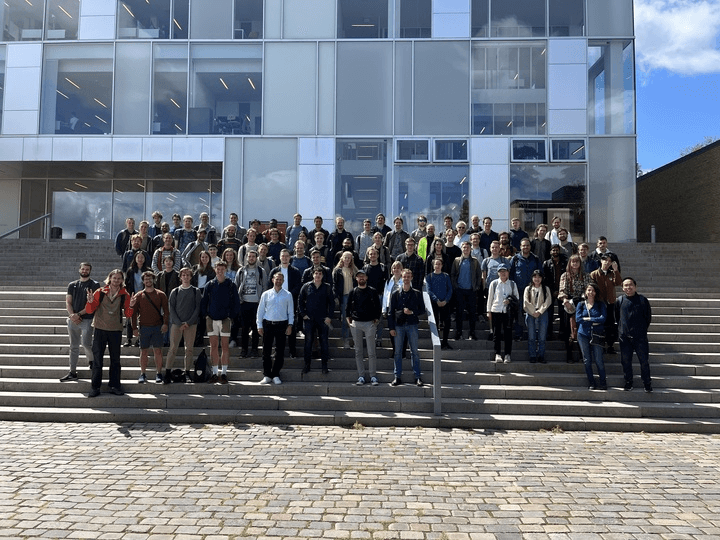 Julia for Bioelectronic Medicine: Electrochemical Modulation Enhances the Selectivity of Peripheral Neurostimulation In Vivo is a new article in the Proceedings of the National Academy of Sciences using Julia to study electrical nerve stimulation.
Julia for Bioelectronic Medicine: Electrochemical Modulation Enhances the Selectivity of Peripheral Neurostimulation In Vivo is a new article in the Proceedings of the National Academy of Sciences using Julia to study electrical nerve stimulation.
Julia for Disease Dynamics: Asymmetric Host Movement Reshapes Local Disease Dynamics in Metapopulations is a new article in Nature using Julia to study how the movement of individuals affects disease dynamics.
Julia for Protein Design: Julia for Protein Design? is a new blog post from biochemist José Pereira introducing ProtoSyn.jl and explaining why Julia is a good choice for next-generation protein design.
Julia for Weather: TropicalCyclonePotentialIntens<wbr>ity.jl is a new tool from Argel Ramírez Reyes for computing Convective Available Potential Energy and tropical cyclone potential intensity using Julia. Click here for more.
Julia for Beam Theory: GXBeam: A Pure Julia Implementation of Geometrically Exact Beam Theory is a new article in the Journal of Open Source Software using GXBeam.jl, a geometrically exact beam theory package written completely in Julia.
Statistical Rethinking (2nd Edition) Now Available with Julia Code: Max Lapan has ported all the code in Richard McElreath’s Statistical Rethinking (2nd Edition) to Julia. Click here for more.
Talk Julia Podcast: The Talk Julia weekly podcast continued with Episode 20: From BASIC to Julia - Viral Shah’s Julia Journey. Click here to listen.
JuliaHub: JuliaHub is the entry point for all things Julia: explore the ecosystem, build packages and deploy a supercomputer at the click of a button. JuliaHub also allows you to develop Julia applications interactively using a browser-based IDE or by using the Pluto notebook environment and then scale workloads to thousands of cores. Version 5 features a brand new user interface, reduced app startup latency, and many more usability enhancements. JuliaHub is the easiest way to start developing in Julia or share your work using dashboards and notebooks.
More information is available in these two presentations from Dr. Matt Bauman (Julia Computing):
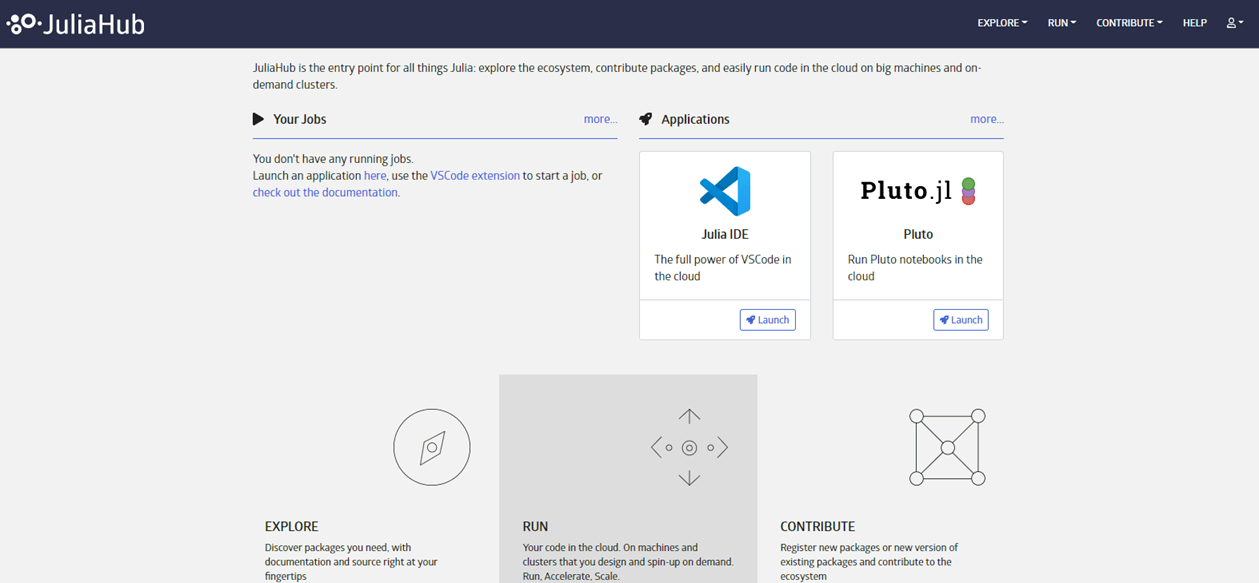
Dyad (Formerly JuliaSim): Dyad is a next generation cloud-based modeling and simulation platform, combining the latest techniques from scientific machine learning with equation-based digital twin modeling and simulation. More information about Dyad (Formerly JuliaSim) is available here.
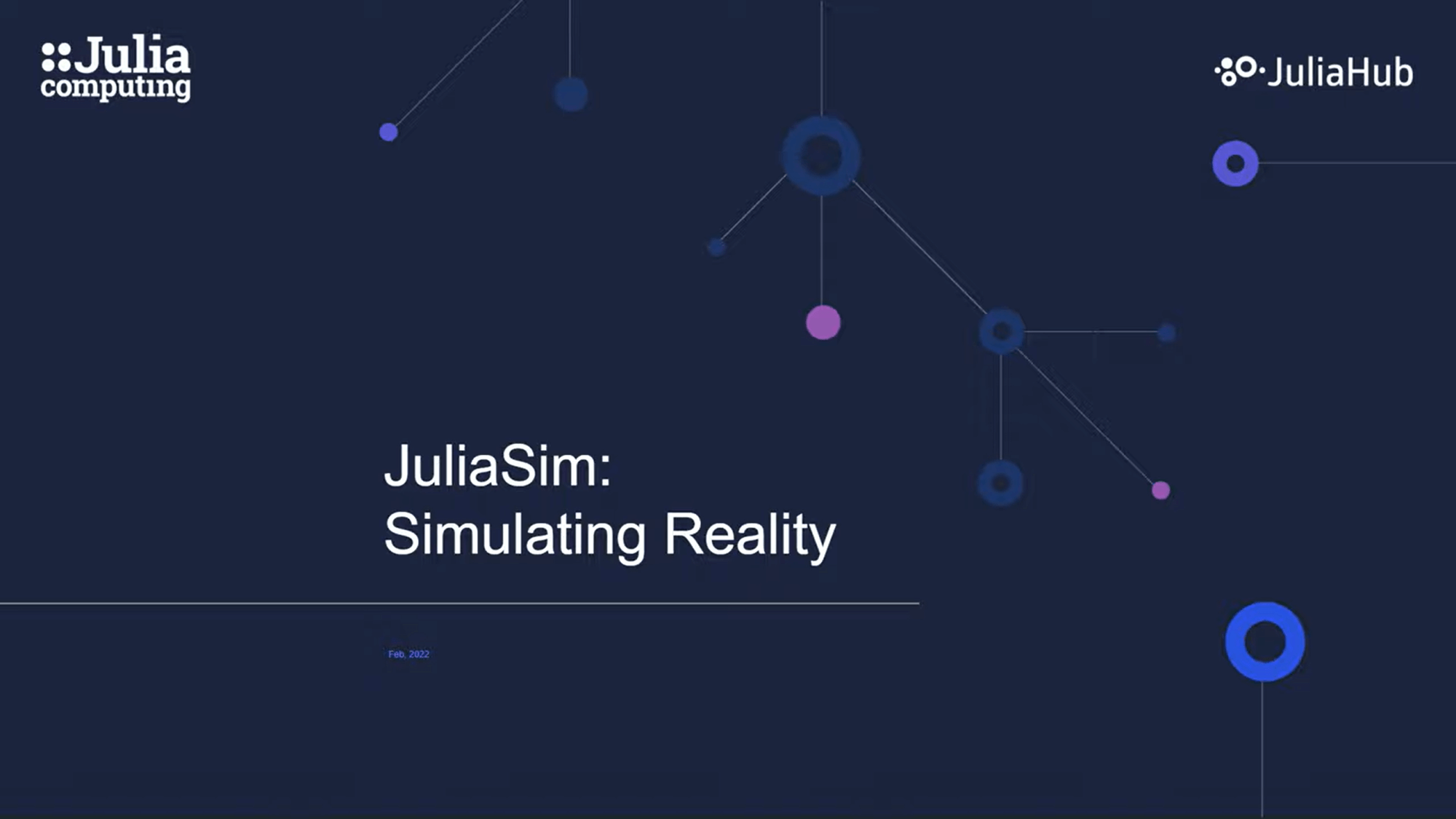 Pumas: Pumas is the revolutionary advanced healthcare analytics platform that facilitates quantitative capabilities across the drug development cycle. Designed from the ground up in Julia, Pumas allows users to scale, integrate and accelerate their quantitative scientific activities all under one umbrella. Pumas is a product of Pumas-AI and deployed through the JuliaHub platform from Julia Computing to leverage JuliaHub's ease of use and scalability. Julia Computing is a technology partner and exclusive reseller of Pumas. Click here for more information.
Pumas: Pumas is the revolutionary advanced healthcare analytics platform that facilitates quantitative capabilities across the drug development cycle. Designed from the ground up in Julia, Pumas allows users to scale, integrate and accelerate their quantitative scientific activities all under one umbrella. Pumas is a product of Pumas-AI and deployed through the JuliaHub platform from Julia Computing to leverage JuliaHub's ease of use and scalability. Julia Computing is a technology partner and exclusive reseller of Pumas. Click here for more information.
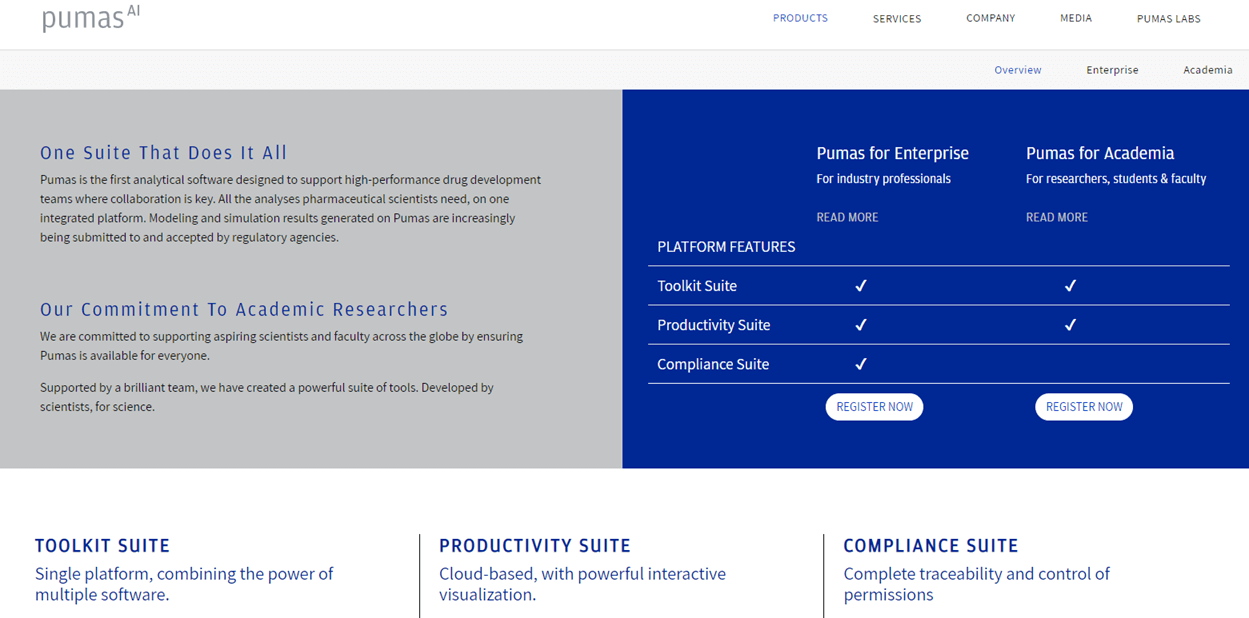 Converting from Proprietary Software to Julia: Are you looking to leverage Julia’s superior speed and ease of use, but limited due to legacy software and code? Julia Computing and our partners can help accelerate replacing your existing proprietary applications, improve performance, reduce development time, augment or replace existing systems and provide an extended trusted team to deliver Julia solutions. Leverage experienced resources from Julia Computing and our partners to get your team up and running quickly. For more information, please contact us.
Converting from Proprietary Software to Julia: Are you looking to leverage Julia’s superior speed and ease of use, but limited due to legacy software and code? Julia Computing and our partners can help accelerate replacing your existing proprietary applications, improve performance, reduce development time, augment or replace existing systems and provide an extended trusted team to deliver Julia solutions. Leverage experienced resources from Julia Computing and our partners to get your team up and running quickly. For more information, please contact us.
Careers at Julia Computing: Julia Computing is a fast-growing tech company with fully remote employees in 12 countries on 5 continents. Click the links below to learn more about exciting careers and internships with Julia Computing.
Marketing
Sales
Human Resources
Engineering
Product and Program Management
Internships
Please click here for more information and to apply.
Julia and Julia Computing in the News
-
Analytics Insight: Top 10 Quantum Computing Jobs to Apply for in June 2022
-
TechTarget: 11 Cloud Programming Languages Developers Need to Know
-
HPCWire: Start-Up Agnostiq Tackles HPC-Quantum Workflow Development
-
Vox EU: The Education–Innovation Gap
-
Proceedings of the National Academy of Sciences: Electrochemical Modulation Enhances the Selectivity of Peripheral Neurostimulation In Vivo
-
TechRepublic: Best Data Science Tools and Software 2022
-
TechRepublic: How to Reskill Yourself for a Career in AI
-
Nature: Asymmetric Host Movement Reshapes Local Disease Dynamics in Metapopulations
-
Journal of Open Source Software: GXBeam: A Pure Julia Implementation of Geometrically Exact Beam Theory
-
Hewlett Packard Enterprise: Julia for Large-Scale Systems: Cost vs Benefits of Trying a New Programming Language
-
Datamation: Top Deep Learning Providers in 2022
Julia Blog Posts
-
Abstraction Is An Ultimate Programming Power (Emmett Boudreau)
-
Everything You Need To Know About Arguments In Julia (Emmett Boudreau)
-
Important Julia Base Functions To Know For Arrays (Emmett Boudreau)
-
DataFrames.jl for Work and Pleasure (Bogumił Kamiński)
-
Benchmarking Split-Apply-Combine: DataFrames.jl vs Pandas (Bogumił Kamiński)
-
Why Do I Use Julia? (Bogumił Kamiński)
-
TSPSolver.jl: 2-opt (Ole Kröger)
-
Julia for Protein Design? (José Pereira)
-
Regression Using MLJ (Matthew Leung)
-
Oxygen.jl: A Breath of Fresh Air for Programming Web Apps in Julia (Nathan Ortega)
-
State Machines and Their Implementation (in Julia) (Andrew Lin)
-
The @view and @views Macros: Are You Sure You Know How They Work? (Bogumił Kamiński)
-
Replacing Legacy Code with Julia (Petr Krysl)
-
The Laplace Approximation (Part 1) (Martin Roa Villescas)
Upcoming Julia Events
-
Online Workshop: Learn Julia with Us - Functions with Julia Gender Inclusive Jun 23
-
Webinar: JuliaHub 101 with Jacob Vaverka (Julia Computing) Jun 28
-
Ljubljana: Population Approach Group Europe (PAGE) with Julia Computing Jun 28-Jul 1
-
Webinar: Quantitative Systems Pharmacology (QSP) in Julia using Pumas-QSP with Dr. Elisabeth Roesch (Julia Computing) Jun 30
-
San Francisco: Design Automation Conference (DAC) with Keno Fischer (Julia Computing) Jul 10-14
-
Pittsburgh: Society for Industrial and Applied Mathematics (SIAM) with Julia Computing Jul 11-15
-
Virtual Workshop: Joint Automated Repository for Various Integrated Simulations (JARVIS) - National Institute of Standards and Technology (NIST) - Artificial Intelligence for Materials Science (AIMS) with Chris Rackauckas (Julia Computing) Jul 12-14
-
Virtual Conference: JuliaCon with Julia Computing Jul 27-29
-
Dallas: American Modelica Conference with Julia Computing Oct 26-28
-
Aurora: American Conference on Pharmacometrics (ACoP) with Julia Computing Oct 30-Nov 2
-
New Orleans: Conference on Neural Information Processing Systems (NeurIPS) with Julia Computing Nov 28-Dec 9
Recent Julia Online Events
-
Virtual Meetup: Julia Meetup with Boulder Data Science, Machine Learning and AI May 19
-
Virtual Meetup: Coffee Meeting (Online) with Julia Gender Inclusive May 22
-
Cambridge, MA: 2022 Innovation Showcase with Julia Computing at MIT Sloan CIO Symposium May 22-23
-
Denver: Advanced Research Projects Agency - Energy (ARPA-E) Innovation Summit with Julia Computing May 23-25
-
Virtual Meetup: Machine Learning and Julia with Machine Learning Utah and MX Technologies May 24
-
Webinar: Stipple - Building An Interactive App for Data Exploration and Model Explanation with Jeremie Bouchard (Julia Computing) May 26
-
Virtual Conference: Intel oneAPI Developer Summit at International Supercomputing Conference with Tim Besard and Jacob Vaverka (Julia Computing) May 27
-
Virtual Meetup: Coffee Meeting (Online) with Julia Gender Inclusive May 29
-
New York: Julia Finance Seminar with Stefan Karpinski and Deepak Vinchhi (Julia Computing) Jun 1
-
Atlanta: American Control Conference with Chris Rackauckas (Julia Computing) Jun 8-10
-
San Diego: Association for Computing Machinery (ACM) Special Interest Group on Programming Languages (SIGPLAN) Conference on Programming Language Design and Implementation (PLDI) with Keno Fischer (Julia Computing) Jun 13-17
-
Kongens Lyngby: PhD Course on Scientific Machine Learning with Chris Rackauckas (Julia Computing) Jun 13-17
Contact Us: Please contact us if you wish to:
-
Purchase or obtain license information for products such as JuliaHub, Dyad (Formerly JuliaSim) or Pumas
-
Obtain pricing for Julia consulting projects for your organization
-
Schedule online Julia training for your organization
-
Share information about exciting new Julia case studies or use cases
-
Spread the word about an upcoming online event involving Julia
-
Partner with Julia Computing to organize a Julia event online
-
Submit a Julia internship, fellowship or job posting
About Julia Computing and Julia
Julia Computing's mission is to develop products that bring Julia's superpowers to its customers. Julia Computing's flagship product is JuliaHub, a secure, software-as-a-service platform for developing Julia programs, deploying them, and scaling to thousands of nodes. It provides the power of a supercomputer at the fingertips of every data scientist and engineer. In addition to data science workflows, JuliaHub also provides access to cutting-edge products such as Pumas for pharmaceutical modeling and simulation, Dyad (Formerly JuliaSim) for multi-physics modeling and simulation, and Cedar for electronic circuit simulation, combining traditional simulation with modern SciML approaches.
Julia is the fastest high performance open source computing language for data, analytics, algorithmic trading, machine learning, artificial intelligence, and other scientific and numeric computing applications. Julia solves the two language problem by combining the ease of use of Python and R with the speed of C++. Julia provides parallel computing capabilities out of the box and unlimited scalability with minimal effort. Julia has been downloaded by users at more than 10,000 companies and is used at more than 1,500 universities. Julia co-creators are the winners of the 2019 James H. Wilkinson Prize for Numerical Software and the 2019 Sidney Fernbach Award. Julia has run at petascale on 650,000 cores with 1.3 million threads to analyze over 56 terabytes of data using Cori, one of the ten largest and most powerful supercomputers in the world.
About the Author
Andrew Claster
Andrew Claster has more than 25 years experience in survey research, polling, data and analytics. Andrew previously served as Deputy Chief Analytics Officer for the Obama 2012 re-election campaign, Deputy Targeting Director of the Democratic National Committee and World Bank consultant, and has conducted political and consumer surveys in more than 20 countries.

